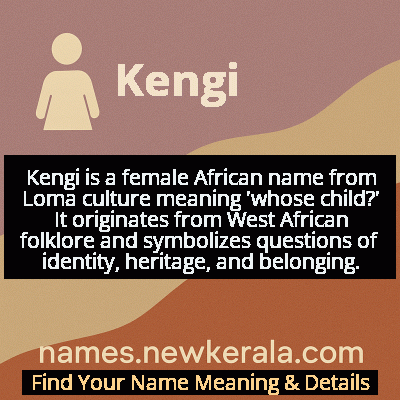Kengi Name Meaning & Details
Origin, Popularity, Numerology Analysis & Name Meaning of Kengi
Discover the origin, meaning, and cultural significance of the name KENGI. Delve into its historical roots and explore the lasting impact it has had on communities and traditions.
Name
Kengi
Gender
Female
Origin
African
Lucky Number
1
Meaning of the Name - Kengi
Kengi is a female African name from Loma culture meaning 'whose child?' It originates from West African folklore and symbolizes questions of identity, heritage, and belonging.
Kengi - Complete Numerology Analysis
Your Numerology Number
Based on Pythagorean Numerology System
Ruling Planet
Sun
Positive Nature
Leaders, ambitious, highly driven, self-reliant, innovative.
Negative Traits
Overly aggressive, domineering, impatient, selfish.
Lucky Colours
Red, orange, gold.
Lucky Days
Sunday.
Lucky Stones
Ruby, garnet.
Harmony Numbers
2, 3, 9.
Best Suited Professions
Entrepreneurs, managers, engineers.
What People Like About You
Courage, determination, leadership.
Famous People Named Kengi
Kengi Kamara
Community Leader
Founded women's education initiatives in Liberia
Kengi Taylor
Cultural Preservationist
Documented and preserved Loma oral traditions and folktales
Kengi Johnson
Educator
Established literacy programs for rural West African communities
Name Variations & International Equivalents
Click on blue names to explore their detailed meanings. Gray names with will be available soon.
Cultural & Historical Significance
Within Loma cultural practices, names like Kengi are often given in specific circumstances that relate to the child's birth story or family history. The name might be chosen when there are questions about lineage, when a child is born under unusual circumstances, or when the family wishes to emphasize the importance of understanding one's roots. The folktale origin provides a narrative framework that helps shape the child's identity and reminds the community of shared values around kinship and belonging. This cultural significance extends beyond individual identity to reinforce collective memory and intergenerational connections.
Extended Personality Analysis
Women named Kengi are often perceived as deeply introspective and curious about their origins and place in the world. They typically exhibit strong investigative qualities, always seeking to understand the 'why' behind people's actions and relationships. This natural curiosity makes them excellent problem-solvers and mediators in community disputes. Kengi's tend to be highly empathetic, able to understand multiple perspectives in complex situations. Their questioning nature, stemming from the name's meaning 'whose child?', often translates into a lifelong pursuit of knowledge and understanding about human connections.
In social settings, Kengi's are known for their ability to create deep, meaningful relationships while maintaining a certain enigmatic quality. They are often the family historians or the keepers of oral traditions, naturally drawn to understanding how personal stories fit into larger historical narratives. Their strength lies in balancing curiosity with wisdom, asking probing questions while respecting cultural boundaries. This combination of traits frequently leads them toward careers in education, counseling, cultural preservation, or community leadership, where their innate understanding of human connections and identity serves them well. They embody the idea that knowing where you come from helps determine where you're going.
Modern Usage & Popularity
In contemporary times, Kengi remains primarily used within Loma communities and among diaspora populations, particularly in Liberia, Guinea, and immigrant communities in the United States and Europe. The name has seen a resurgence as part of the broader movement toward reclaiming African cultural heritage and traditional naming practices. While not among the most common African names globally, it holds significant cultural weight within specific communities. Modern usage often bridges traditional meaning with contemporary identity, with parents choosing the name to honor ancestral roots while giving their daughters a unique identity that speaks to questions of heritage and belonging in an increasingly globalized world. The name's rarity outside its cultural context makes it distinctive while maintaining deep cultural resonance for those familiar with its origins.
Symbolic & Spiritual Meanings
Symbolically, Kengi represents the universal human quest for identity and belonging. The question 'whose child?' extends beyond literal parentage to encompass one's relationship to community, heritage, and cultural legacy. It symbolizes the journey of self-discovery and the understanding that identity is often layered with multiple influences and histories. The name carries metaphorical weight as representing bridges between past and present, tradition and modernity, individual and community. It embodies the idea that true understanding of self comes from exploring one's connections to others and recognizing that every person carries within them the stories of those who came before, making identity both a personal journey and a collective inheritance.

